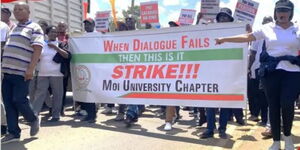The Ministry of ICT has opposed a proposed amendment to the law that would allow county governments to levy charges on public power lines, warning that such a move could increase broadband internet costs.
Appearing before the Senate Committee on Energy, chaired by Siaya Senator Oburu Oginga, ICT Principal Secretary Stephen Isaboke warned that the proposed amendment to the Energy Act could disrupt national broadband projects and digital infrastructure rollout and potentially lead to extra unregulated charges on internet service.
The amendment seeks to allow county governments to levy charges on public energy infrastructure without first getting approval from the Cabinet Secretary for Energy and Petroleum.
According to the ministry, giving counties authority to impose fees without approval from the Energy CS would fragment regulation and slow project implementation.
The ministry highlighted risks to key network rollout projects, including the National Optic Fibre Backbone Infrastructure (NOFBI) and the Last Mile County Connectivity Project (LMCCP).
“While the Ministry supports devolution and recognises the importance of empowering county governments, the proposed amendment would undermine national cohesion and efficiency,” Isaboke said.
“Uncoordinated levies would inflate broadband costs, delay rural connectivity, discourage private investment, and ultimately raise consumer prices for digital services,” the Ministry warned.
Under the current framework, the government uses a centralised revenue model for wayleave fees on public power lines.
Telecommunications companies pay charges to Kenya Power, which collects the levies and subsequently remits the funds to county governments, with the system designed to ensure consistency, avoid unpredictable fees, and prevent disruptions to national ICT and broadband projects.
This has, however, resulted in fallouts and revenue wars between county governments and Kenya Power. Earlier this year, an ugly scene was witnessed between the Nairobi County government and the utility provider over a Ksh4.9 billion wayleave fee.
Responding to the senators, PS Isaboke defended the centralised revenue model, saying it ensures equitable distribution through the national system.
At the same time, Senators led by Edwin Sifuna and Bonny Khalwale urged the Ministry to ensure counties benefit from revenues generated through the ICT infrastructure mounted on the Kenya Power transmission network.
Additionally, Sifuna demanded that the Ministry disclose how much telecommunications companies pay for using public infrastructure.
Internet Providers
On their part, the service providers, led by Fiona Asonga, CEO of the Technology Service Providers of Kenya (TESPOK), called for a more supportive regulatory environment for the data industry.
“We are requesting a special tariff from the Ministry of Energy, through EPRA, for the telecommunications and data industry, just like the special tariffs extended to the manufacturing sector,” Asonga said.












